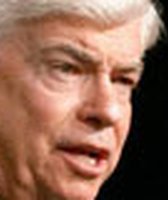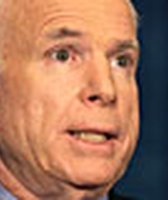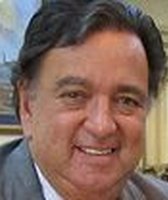Get PolitiFact in your inbox.
SUMMARY: A key element of the Mitt Romney campaign is his record as a turnaround specialist in business, government and even the Olympic Games. But the record is not always as clear as his campaign ads.
By his own account, Romney almost single-handedly saved the 2002 Winter Olympics in Salt Lake City.
His new television ad says he "took on the bankrupt Olympics and turned them around."
Another ad: "An Olympics hit by scandal and deficits, he rescued them."
He's written a book titled Turnaround: Crisis, Leadership and the Olympic Games. The work Romney did in Salt Lake City has become part of his legend. But some people in Utah contend it's a bit of a myth. He didn't do it all by himself, and they believe that the Republican presidential candidate deserves a gold medal for chutzpah.
"I know that's a sensitive issue out here," said Robert Garff, former chairman of the board of the Salt Lake City Organizing Committee and the person responsible for hiring Romney. "Did he do it all by himself? No. Does he deserve all the credit? No."
But Garff, who is supporting Romney's presidential candidacy, defended the oversimplified message: "You're talking about a 10-second sound bite."
In two of his campaign ads, Romney stresses his success in three areas. First, turning around the Olympics. There's no question he was a huge part of the success, but even his supporters say he was only one of many who made the Games a big hit.
The ads also claim he is an innovator who revolutionized American business and turned around major companies. While it is difficult to gather much empirical evidence on his business background, the anecdotal evidence suggests Romney has been a huge success, impressing management experts across the country.
Finally, the ads contend that Romney cut spending instead of raising taxes to resolve a fiscal crisis in the nation's most Democratic state. Politicians often define tax increases narrowly when it suits them, and Romney appears to have done so in his ads.
He and the state legislature did trim spending, but they also increased various fees during his one term as governor and they closed loopholes in the corporate income tax system. Those who were hit by the fee increases or the corporations whose taxes went up when loopholes were closed might consider those tax increases.
In 1977, after working at the Boston Consulting Group, Romney joined Bain & Co., considered one of the country's hottest consultants. Companies hired Bain to help them, and anecdote after anecdote indicates that Romney, equipped with an extremely sharp mind, excelled at his job. But the turning point came when Bain & Co. decided to use its consulting expertise to buy troubled companies, turn them around and then sell them. Bain Capital was born.
"There's not been a better company in the industry than Bain Capital," said Howard Anderson, a lecturer at MIT's Sloan School of Management. Anderson said Romney was among the first to realize that Bain's expertise could be used not just for contract work with companies, but for investing. "He knew how to take the brainpower that was Bain and turn it into money," said Anderson, who sat on the board of one company with Romney.
Other companies have since adopted the Bain model, said Steve Kaplan, a professor of finance at the University of Chicago School of Business. He added that if being able to charge higher fees is an indication of success, then Bain has been very successful.
Romney's biggest success may have been deciding to invest in Staples, the office supply giant. Bain put about $600,000 in the company, which opened one store in Brighton, Mass., in 1986. The company went public in 1989. Today, it has 1,962 stores and in 2006 had $18.2-billion in sales.
Meanwhile, Bain & Co., the consulting company, found itself in financial trouble, so Romney left the capital group to help get the consulting operation back on its feet. The board "took a blood oath" to bail the company out, said Anderson. "They would not have done that for anyone but Mitt."
Romney's talent is "that he could see patterns and could execute. I'm not going to vote for him, but as a businessman, he's marvelous," Anderson said.
Romney's business success came back to haunt him a bit in his 1994 Senate race against Democrat Edward Kennedy. Kennedy filmed campaign ads in Indiana, where Bain Capital had purchased an office supply company and laid off the workers. Romney lost the race.
The Salt Lake Olympics were in dire straits when Romeny took over as chief executive in February 1999. At that moment, it faced an operating deficit of nearly $400-million.
Previous chief executive Thomas K. Welch and vice president David R. Johnson had decided that the key to winning the Games was spreading more than $1-million in gifts to International Olympics Committee members. When the media uncovered the gift-giving, several members of the committee were forced to resign, and suddenly the Games were cloaked in scandal.
The Justice Department and Congress were investigating. Sponsors wondered if they still wanted their names attached to the Games.
"Was it bankrupt?" Garff asked. "No, but it was at a low." Expenses did exceed revenue, but he attributed some of that to pledges that had not yet been collected.
Garff said Romney did keep one wavering sponsor, John Hancock, from bolting. "It was a very important signal to the rest of the sponsors that he had righted the ship."
Retaining John Hancock was vital to rescuing the Olympic brand, said Stephen A. Greyser, a professor emeritus at the Harvard Business School and a specialist in sports marketing. And Romney was instrumental in keeping John Hancock in the fold, he said. "It was Mitt Romney who was, in essence, Mr. Integrity," Greyser said. David D'Alessandro, the former John Hancock official who threatened to pull the company's sponsorship, was not available for comment. Many big sponsors predated Romney's involvement in the Games, said Sydney Fonnesbeck, a former member of the Salt Lake City Council and a friend of Welch's. "He just came in and gathered the money that was already (pledged)," she said.
Garff confirmed, too, that the Olympics' television contract with NBC — worth between $400-million and $500-million — had been negotiated well before Romney joined the Olympic effort.
Salt Lake Tribune columnist Paul Rolly in August reported a conversation he had with former Tribune publisher John W. "Jack" Gallivan. The elderly Gallivan had said he had received a fundraising letter from Romney claiming that he had "erased a $379-million operating deficit, organized 23,000 volunteers and galvanized community spirit after the demoralizing scandals, which had wrapped the city's morale."
Gallivan, according to Rolly, said he had been working on the Olympic effort since 1966 and that his son, Mickey, volunteered to do the Games' communications work. "The volunteers would have been there regardless … and morale in the city was never low," Rolly concludes.
Still, Romney does deserve a huge amount of credit, according to a member of the International Olympic Committee at the time. "If no one had stepped in and taken charge, there would certainly have been an organizational and financial disaster," Richard Pound, a Montreal attorney, wrote in response to e-mail questions. "There were good people in the organization, but for them to have been able to do the many things that needed to be done, they needed a good leader who could make decisions and empower them."
But Fonnesbeck said Romney alienated some people with whom he worked during the Games. "He didn't want to give anyone else any credit," she said. "We became nobodies. A lot of us were hurt and angry. It didn't surprise any of us when he ran home and ran for governor."
The fiscal mess Romney confronted when he took over the Olympic effort was nothing compared to the $3-billion deficit he tackled when he took over as Massachusetts governor in 2003. As a Republican, he was vehemently opposed to raising taxes to balance the budget and vowed to cut spending instead.
And he succeeded, according to his campaign commercials, which claim that he did not increase taxes while he was governor. There is evidence to support this claim and to undermine it.
Romney did not increase income taxes for individuals and the state did not increase the sales tax while he was governor.
On the other hand, the state consistently increased fees for such things as registering a boat and filing a court case. And it did increase corporate income taxes by closing loopholes. In addition, the state decreased payments to cities and towns, meaning that local governments had to shift the burden of paying for services to the property tax.
For instance, in 2003, Romney's first year in office, the governor and the state legislature reduced payments to cities and towns by 5.8 percent. The state increased a myriad of fees by some $218-million — Romney had proposed increasing fees by $400-million. And the state increased corporate income taxes by $174-million, according to the National Association of State Budget Officers. "The suggestion that he didn't raise revenue is not accurate," said Michael Widmer, president of the Massachusetts Taxpayers Association, a conservative group. If aid to cities and towns decreases, then property taxes at the local level increase, he said, adding that "it is a little bit indirect."
The Club for Growth, a conservative political action committee that pushes for spending cuts and tax cuts, evaluated Romney's fiscal record. "Overall, Romney's record on tax policy is mixed," the Club concluded. "His record is marred by questionable statements and positions and his fee hikes and 'loophole' closures are troubling." However, the Club applauded Romney for supporting broad-based tax cuts.
The force of his personality and his "raw horsepower," as MIT's Howard Anderson put it, helped drive Romney to huge individual success as a businessman, leaving little to quarrel about his claims to have bailed out companies that were on the ropes.
You can always find people to quibble about how much credit is too much credit, but it's clear that Romney was the pivotal player in the restoration of the Salt Lake City Olympic Games.
Our Sources
CQ interview with Robert Garff, former chairman of the board of the Salt Lake City Organizing Committee, Sept. 18, 2007.
CQ interview with Howard Anderson, a lecturer at MIT's Sloan School of Management, Sept. 18, 2007.
CQ interview with Steve Kaplan, a professor of finance at the University of Chicago School of Business, Sept. 18, 2007.
CQ interview with Sydney Fonnesbeck, former member of the Salt Lake City Council, Sept. 18, 2007.
CQ interview with Michael Widmer, president of the Massassachusetts Taxpayers Association, Sept. 18, 2007.
CQ telephone interview with Robert Garff, chairman of the Salt Lake City Organizing Committee, Sept. 17, 2007.
CQ telephone interview with Sydney Fonnesbeck, former member of the Salt Lake City Council, Sept. 17, 2007.
CQ telephone interview with Stephen A. Greyser, a professor emeritus at the Harvard Business School and a specialist in sports marketing, Sept. 25, 2007.
CQ e-mail interview with Richard Pound, a member of the International Olympic Committee, Sept. 25, 2007.
Bain & Co.




































